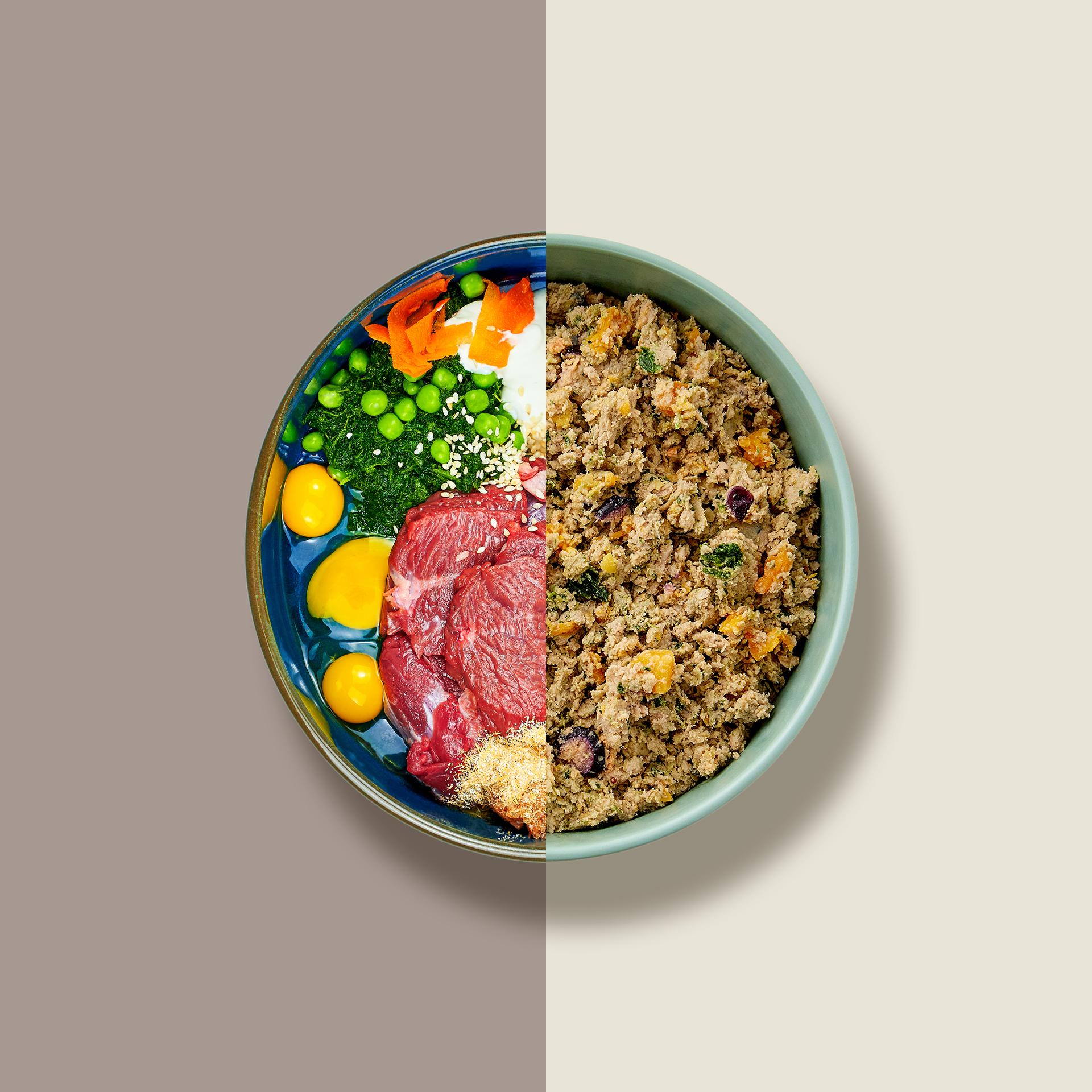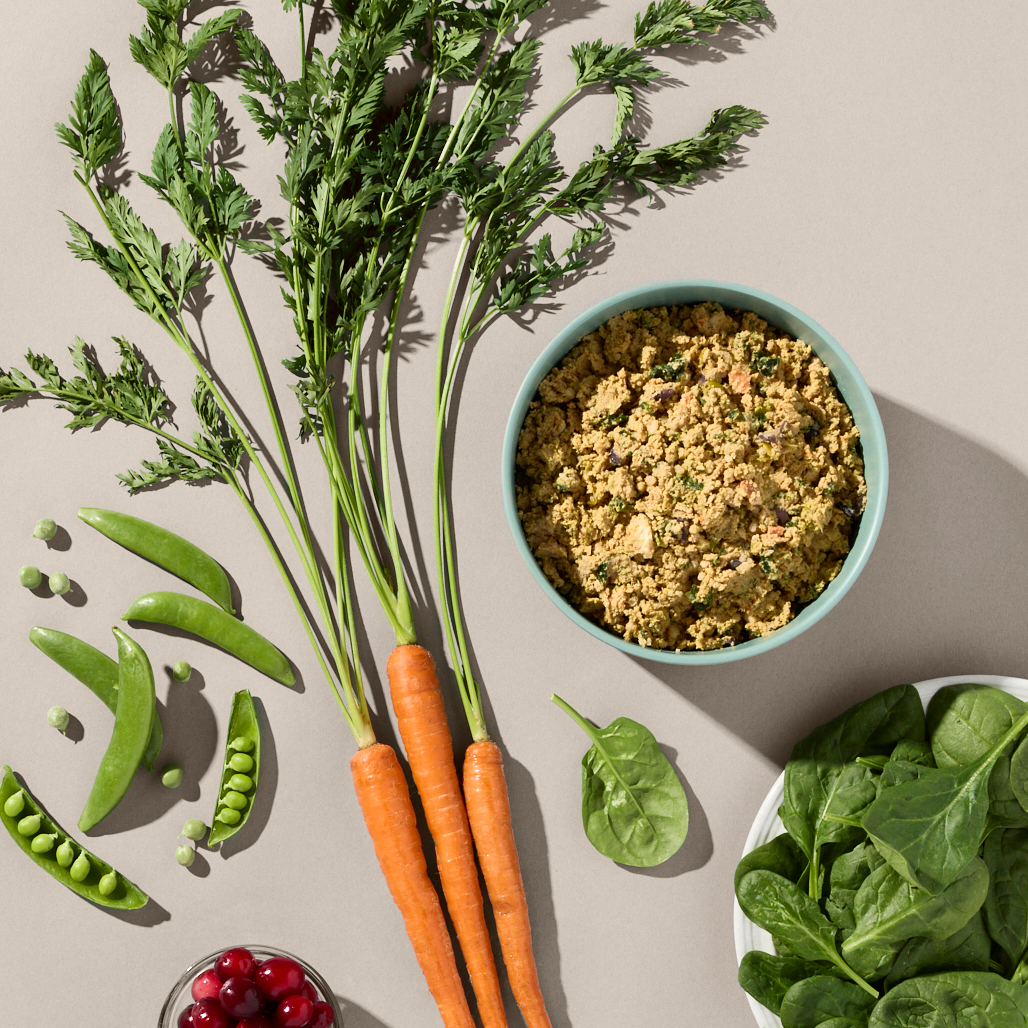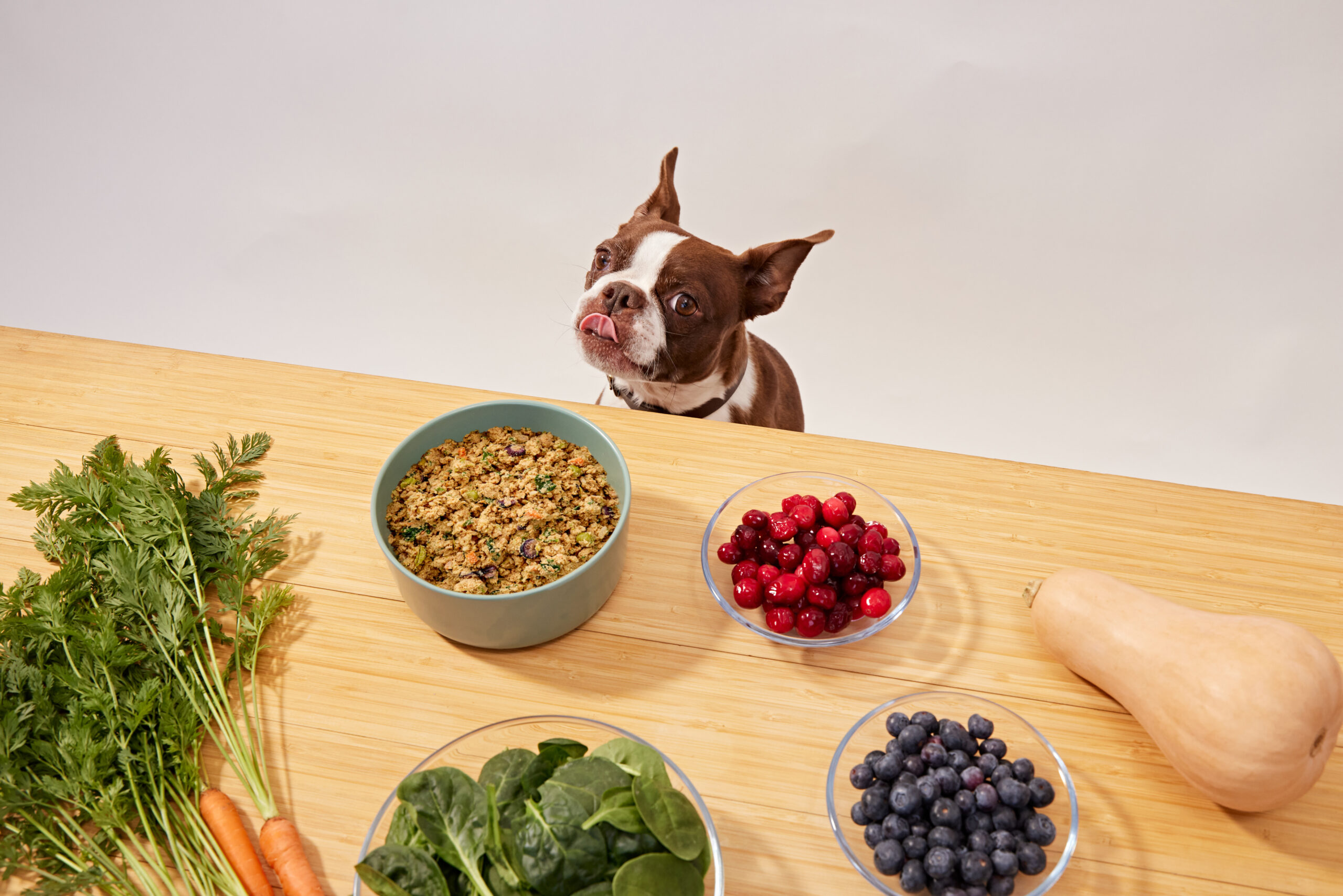Hey Ollie blog readers! We’re offering you an exclusive 60% OFF your starter box! Try now!
You’re relaxing on the couch when your dog jumps up beside you, tail wagging, eyes bright—and then suddenly burp. You freeze. Did that really come from him? Can dogs burp?
Yes, they can. And if you’ve noticed your pup letting out little belches here and there, you’re not alone. While it might catch you off guard the first time, dog burping is actually a real thing. But is it normal? And when should you worry?
In this guide, we’re breaking it all down. We’ll answer the big questions—can dogs burp, why does my dog keep burping, and is it normal for a dog to burp after eating? Plus, we’ll share what causes it, when it’s harmless, and when it might signal something more serious.
Because while a burp here or there might just be air, it could also be your dog’s way of telling you something isn’t sitting quite right.
Can Dogs Burp? Yes — And Here’s Why It Happens
Yes, dogs can burp—just like we do. In fact, it’s completely normal in most cases. A burp is simply your dog’s way of getting rid of excess air that’s built up in their stomach.
This can happen when dogs swallow air while eating, drinking, panting, or even during play. The swallowed air—called aerophagia—travels to the stomach and sometimes needs a way out. If it goes up, it’s a burp. If it goes down, well… you might hear it from the other end.
As Dr. Andrea Tu, DVM, explains to the American Kennel Club, dogs burp for the same reason people do, gas builds up and needs a way out.
The sound might be softer than a human burp, but the process is surprisingly similar. And while an occasional burp is nothing to worry about, consistent or loud burping could mean your dog is swallowing more air than usual—or that something’s irritating their digestive system.
Dogs with flat faces, like Bulldogs and Pugs, tend to burp more often because they’re more prone to gulping air. Fast eaters and anxious drinkers can also be frequent burpers.
If you’ve ever caught yourself thinking, “Why does my dog keep burping after meals?”—you’re not imagining things. There’s usually a reason behind it. And we’re getting into those next.
Why Does My Dog Keep Burping? Top 7 Common Causes
A burp every now and then is normal. But if your dog seems to be burping all the time—especially after eating—there’s likely an underlying reason. Here are the most common causes of dog burping, especially after meals:
1. Eating Too Fast
Dogs that inhale their food tend to swallow a lot of air along with it. That air builds up in the stomach and eventually escapes as a burp. Fast eaters are also more prone to bloating and indigestion.
Tip: Try a slow feeder bowl to reduce gulping and encourage mindful chewing.
2. Swallowing Air While Drinking
Just like with food, drinking water too quickly can trap air in your dog’s stomach. This is especially common after exercise or play, when dogs are panting heavily.
3. Playing Right After Meals
If your dog runs or jumps around immediately after eating, it can shake up the stomach and release gas. It’s a good idea to let your pup rest for 20–30 minutes after meals.
4. Low-Quality or Hard-to-Digest Food
Some commercial dog foods use fillers like corn, soy, or artificial additives that are harder for dogs to digest. These can increase gas buildup and lead to more burping.
According to the Cummings Veterinary Medical Center at Tufts University, diets high in poorly digestible ingredients can cause gastrointestinal symptoms like gas and bloating.
5. Food Sensitivities or Allergies
Burping may also be a sign that your dog’s food isn’t agreeing with them. Common triggers include dairy, chicken, wheat, or beef. If your dog also has loose stools or itchy skin, food sensitivity might be the cause.
6. Gastrointestinal Upset or Acid Reflux
Just like in people, acid reflux in dogs can cause burping. The stomach acid bubbles up and releases gas, often making dogs lick their lips, swallow frequently, or burp more.
Many vets report that GI disorders are one of the top health concerns seen in dogs, with symptoms ranging from vomiting to abnormal gas patterns.
7. Medical Conditions That Affect the Digestive System
Conditions like hiatal hernias, bloat (GDV), or pancreatitis can also lead to increased burping. While rare, these issues need prompt attention—especially if the burping is paired with discomfort or other symptoms.
4. Dog Burping After Eating: Is It Normal or Not?
An occasional burp after a meal? Totally normal. Dogs, like humans, swallow air while they eat. That air needs to go somewhere—and a quick belch is one way the body handles it.
But here’s where it gets important: frequent or intense burping after meals isn’t always harmless. If your dog seems uncomfortable, burps excessively, or shows other symptoms, it could point to a deeper issue in the digestive tract.
When It’s Probably Fine:
- Burps are soft, infrequent, and happen only after meals
- Your dog is happy, active, and eating well
- No other symptoms like vomiting or diarrhea
When It’s Worth a Closer Look:
- Burping happens after every meal
- It’s loud, repetitive, or seems to bring discomfort
- Your dog gags, drools, or paces after eating
- Appetite is low or energy levels drop
Quick Tip: If your dog burps after eating but seems perfectly normal otherwise, there’s usually no cause for concern. But if you’re seeing a pattern—and it’s paired with other signs—it’s smart to keep a food journal and talk to your vet.
“Is it normal for a dog to burp?” Yes, within reason. But if you’re asking, “Why does my dog keep burping after eating?” Especially every single day, it’s time to look at what they’re eating, how fast they’re eating it, and how their body is responding.
Conditions Linked to Excessive Burping in Dogs
If your dog is burping a lot—especially when it’s paired with other symptoms like discomfort, vomiting, or a change in appetite—it might be more than just air. Certain medical conditions can cause excessive gas buildup or affect how food and air move through the digestive system.
Here are some of the most common health conditions linked to dog burping:
Gastroesophageal Reflux Disease (GERD)
Just like in people, GERD causes stomach acid to flow back into the esophagus. This can create irritation, gas buildup, and frequent burping. You may also notice your dog licking their lips or swallowing excessively.
Bloat (Gastric Dilatation-Volvulus)
This is a life-threatening condition where the stomach fills with gas and twists. Burping can sometimes be an early sign of bloat, along with a tight belly, restlessness, and unproductive retching. Large, deep-chested breeds are at higher risk.
Warning: If you suspect bloat, don’t wait. Get to a vet immediately.
Hiatal Hernia
A hiatal hernia occurs when part of the stomach pushes into the chest cavity. It’s rare but can cause chronic burping, vomiting, and poor weight gain. Diagnosis often requires imaging and treatment varies based on severity.
Pancreatitis
When the pancreas becomes inflamed, it can disrupt digestion and lead to gas formation. This condition usually comes with vomiting, loss of appetite, and abdominal pain—burping may just be one small piece of the puzzle.
Inflammatory Bowel Disease (IBD)
Dogs with IBD often experience chronic inflammation in the gut. This leads to poor digestion, gas, and yes—burping. Other signs include loose stools, weight loss, and frequent tummy rumbling.
If you’re thinking, “Why does my dog keep burping AND acting off?”—you’re right to dig deeper. While some causes are minor, others can be serious and need veterinary support. In the next section, we’ll walk through practical steps to reduce burping and support better digestion.
Treatment Options: How to Reduce Dog Burping
If your dog is burping more than usual, don’t panic—but do take it as a sign to reassess their routine. Most of the time, small changes in how your dog eats and what they eat can make a big difference.
Here’s how to reduce dog burping and support a happier, more comfortable belly:
Change How Your Dog Eats
Slowing down your dog’s eating can significantly reduce air intake.
- Use a slow feeder bowl: These bowls make it harder for dogs to gulp down food, cutting back on swallowed air.
- Split meals into smaller portions: Feeding 2–3 smaller meals instead of one large one helps prevent stomach overload.
- Avoid play right after meals: Let your dog rest for at least 20 minutes after eating to avoid shaking up the contents of their stomach.
Improve What Your Dog Eats
Diet plays a huge role in digestion and gas levels.
- Choose fresh, highly digestible ingredients: Dogs digest minimally processed proteins and vegetables more easily.
- Avoid fillers and artificial ingredients: Corn, soy, and meat by-products are harder to break down and can lead to gas.
- Watch for food sensitivities: If your dog burps and also shows signs like itching or diarrhea, it could be a sign the food isn’t agreeing with them.
Ollie fresh dog food is made with gently cooked, real ingredients—no hard-to-digest fillers or artificial additives. It’s crafted for dogs with sensitive stomachs and burping-prone bellies.
Ask Your Vet About Digestive Support
If dietary changes don’t help, your vet may recommend:
- Antacids or acid blockers (for reflux or mild GERD)
- Probiotic supplements to improve gut balance
- Prescription diets if a chronic condition like IBD is suspected
What Works for One Dog Might Not Work for Another
Each dog’s digestive system is different. What causes burping in one pup might not affect another. That’s why trial and error, with guidance from your vet, is often the best way forward.
Can Supplements Help with Dog Burping?
Yes—digestive supplements can help reduce burping in dogs, especially when the cause is mild indigestion, food sensitivities, or gut imbalance. These types of supplements work by supporting the natural function of your dog’s digestive system, making it easier for them to break down food and reduce gas buildup.
Here’s what to look for if you’re considering a supplement for a burpy pup:
Probiotics
Probiotics introduce beneficial bacteria into the gut. These good microbes help balance the digestive tract and can reduce symptoms like bloating, gas, and—you guessed it—burping.
Digestive Enzymes
These help break down food more efficiently, especially proteins and fats. When food digests properly, there’s less chance of gas forming and escaping as a burp.
- Dogs with sensitive stomachs or frequent GI issues often benefit from added enzymes.
- Look for blends that include amylase, lipase, and protease.
Natural Soothers
Some supplements also include ingredients that calm the digestive system:
- Pumpkin: A natural source of fiber that supports digestion.
- Ginger: Known to ease nausea and help with gas relief.
- Chamomile: Gentle on the stomach and can help relax the GI tract.
Ollie Probiotic Chews: Made for Dogs Who Need a Little Gut Help
Our probiotic supplements are packed with vet-approved ingredients to support gut health from the inside out. We’ve included probiotics, fiber, and soothing herbs in a chew your dog will actually want to eat.
Whether your dog burps after every meal or just seems gassy more often than usual, a quality supplement can help bring things back into balance.
When to Call the Vet: Warning Signs You Shouldn’t Ignore
Burping by itself usually isn’t a big deal. But when it’s happening often—or paired with other symptoms—it could be your dog’s way of saying something’s wrong.
Here are clear signs it’s time to call your vet:
Red Flags to Watch For
- Burping after every meal, especially with visible discomfort
- Gagging or retching after burping
- Loss of appetite or refusing food
- Drooling, lip licking, or swallowing repeatedly
- Bloated or tight abdomen
- Vomiting or diarrhea
- Lethargy or restlessness after eating
If you ever noticed your dog’s burping to also include discomfort, signs of pain, or other symptoms such as vomiting, then this is a good sign to contact your veterinarian.
What Your Vet Might Recommend
- Abdominal x-rays or imaging to check for bloat, gas patterns, or hernias
- Bloodwork to look for signs of inflammation or organ stress
- Diet evaluation and potential allergy testing
- Medication or prescription food for acid reflux or IBD
The bottom line: If your dog’s burping has changed, either in frequency or intensity, it’s worth checking in with your vet. A quick consult can offer peace of mind and help prevent something small from turning into something serious.
What to Feed a Gassy, Burping Dog
If your dog is burping more than usual, food might be part of the problem—and part of the solution. The right ingredients, portion sizes, and feeding habits can go a long way in supporting smooth digestion and reducing excess gas.
What Helps
- Gently cooked, minimally processed meals
These are easier for dogs to digest, reducing gas buildup and the chance of burping. - Whole, recognizable ingredients
Think real meat, pumpkin, leafy greens, and sweet potatoes—not mystery by-products. - Single-protein diets
These help eliminate potential allergens and reduce digestive irritation. - Proper portion control
Overeating leads to bloating. Serving meals in pre-portioned sizes can prevent overloading the stomach.
What to Avoid
- Artificial preservatives and colors
- Corn, soy, and wheat fillers
- High-fat table scraps or greasy foods
- Sudden diet changes: Switching foods abruptly can cause gas and stomach upset.
Why Ollie Works for Sensitive Stomachs
We make fresh dog food with real, human-grade ingredients—slow-cooked for optimal digestibility. Our meals are formulated by veterinary nutritionists and shipped in perfectly portioned packs for your pup.
If your dog struggles with gas, burping, or post-meal discomfort, a switch to fresh, digestible food can make a world of difference. We even customize your dog’s plan based on their age, breed, size, and sensitivities.
FAQs About Dog Burping
Is it normal for a dog to burp a lot?
An occasional burp is normal. But frequent burping—especially after every meal—can signal that your dog is swallowing too much air, eating too fast, or dealing with a digestive issue.
Why does my dog keep burping after eating?
It usually means your dog is gulping food, swallowing air, or reacting to something in their diet. Food sensitivities, acid reflux, or low-quality ingredients can all lead to post-meal burping.
Do certain dog breeds burp more than others?
Yes. Brachycephalic breeds (like Bulldogs, Boxers, and Pugs) tend to burp more because of their short snouts. Their anatomy makes them more prone to swallowing air while eating or drinking.
Can dog burping be caused by allergies?
Absolutely. Dogs with food allergies or sensitivities may develop excess gas, which can result in burping. Other signs may include itchy skin, ear infections, or loose stools.
Can you prevent dog burping completely?
You can’t always eliminate burping, but you can reduce it by feeding fresh, digestible food, slowing down mealtime, and avoiding known irritants. Supplements and vet guidance may also help.
Tagged As:

The nutrition your dog needs,
the food they want.

Enjoying our articles? Subscribe our Newsletters and get new articles directly to your inbox
You might also like
12 August 2025
5 MINS READ
Raw vs. Gently Cooked: Which Is Ideal for Your Pup?
As more pup parents seek the best fresh dog food for their companions, they may find themselves choosing between a raw diet and a fresh diet. While cases have been made for both options, let’s exa…
by Ollie Pets
12 August 2025
5 MINS READ
Why Human-Grade Ingredients Matter for Your Dog
A healthier, happier dog starts with the right food. That said, knowing which diet is best for your pup can be overwhelming at times. Understanding what human-grade means, why it matters, and how …
by Ollie Pets
12 August 2025
7 MINS READ
Spotlighting the Top Nutrients for Your Dog
Just like humans, your dog’s health depends heavily on the food they consume daily. Read on to learn more about essential nutrients for your dog’s health and explore how fresh, human-grade dog foo…
by Ollie Pets







